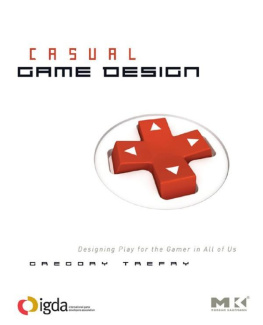The Well-Played Game
The Well-Played Game
A Players Philosophy
Bernard De Koven
The MIT Press
Cambridge, Massachusetts
London, England
2013 Massachusetts Institute of Technology
All rights reserved. No part of this book may be reproduced in any form by any electronic or mechanical means (including photocopying, recording, or information storage and retrieval) without permission in writing from the publisher.
MIT Press books may be purchased at special quantity discounts for business or sales promotional use. For information, please email or write to Special Sales Department, The MIT Press, 55 Hayward Street, Cambridge, MA 02142.
Library of Congress Cataloging-in-Publication Data
DeKoven, Bernie, 1941
The well-played game: a players philosophy / Bernard De Koven.
p. cm.
ISBN 978-0-262-01917-0 (hardcover: alk. paper)
1. GamesPhilosophy. 2. Play (Philosophy) 3. Game theory. I. Title.
GV1201.D374 2013
790.01dc23
2012044957
10 9 8 7 6 5 4 3 2 1
Foreword
Eric Zimmerman
If we cant let go of our games, we cant hold on to each other.
Bernie De Koven is the closest thing we have to a shaman of play.
Not too long ago, I was privileged to take part in a New Games event led by Bernie. On a brisk afternoon in the Netherlands, a few dozen players stood outside in a circle. With the boundless panache of a practiced ringmaster and the eternal patience of a kindergarten teacher, Bernie taught us several games.
Bernie led by example, always reminding us that we could change the rules to suit the moment, or that we could exit the game whenever we wanted. Attuned to the spirit of the group, he flowed effortlessly from one game to another, tweaking a ruleset to make a game feel better, always somehow knowing exactly when it was time to move on.
He wove his spell. Or, rather, we wove it together. As we threw animal gestures across thin air, raced like hell with locked knees to capture enemies, and became a single blind organism with a forest of groping hands, Bernie helped us massage our play into a more beautiful shape. In a short space of time, jaded gamers, know-it-all developers, and standoffish academics became squealing, sweating, smiling purveyors of play.
This is amazing! I can feel the equilibrium shift and restore itself. I cant tell which one of us is making it happen. But I feel so sensitiveI can sense the game... I can sense the way were playing it together. And I love it. I love being this way. I love doing this thing, playing this game with you.
Play Is for Players
Bernie De Koven has spent his life investigating the relationships between being playful and being human. And The Well-Played Game is a masterworka skeleton key for unlocking your soul and letting the play flow in and out.
As books about games go, it does not fit the mold. The Well-Played Game is not a set of instructions for game creators, with tips and tricks about how to craft a more successful product. Its not a lesson book for educators, filled with strategies about how to teach better with games. And its not written for nervous parents or cultural critics to make them feel better about playing.
So who is this book for? The Well-Played Game: A Players Philosophy is a book for players. It is about playing games well. And in the process of learning to play well, becoming a better person. Of course this book is also for game creators, for educators, for scholars, and for everyone else. Not just because we can all benefit from becoming better players, but because beneath Bernies playful prose there is a treasure trove of earth-shattering, mind-blowing ideas about games.
The Well-Played Game was originally written in 1978before the World Wide Web and mobile phones, before videogames came of age in 1980s arcadeshell, even before cable television. But nevertheless it is a book that seems more and more relevant to our increasingly game-ified and information-centric society. The Well-Played Game was perhaps the first book to bridge the design and play of games and look at them as deeply human phenomena. Its wisdom has much to teach those of us making, studying, teaching with, and playing games. It should be required reading for anyone taking play seriously.
If Im playing well, I am, in fact, complete. I am without purpose because all my purposes are being fulfilled. Im doing it. Im making it. Im succeeding. This is the reason for playing this game. This is the purpose of this game for me. The goals, the rules, everything I did in order to create the safety and permission I needed, were so that I could do thisso I could experience this excellence, this shared excellence of the well-played game.
Play vs. Game
Part of the wonder and insight of Bernies book is how it frames and reframes essential questions of games and play. Among those of us that study games professionally, a division often arises between those that choose to focus on gamestheir elegant rules and challenging systemsand those that prefer to emphasize playthe experiences of players and the communities they form.
This division between games and play is perhaps a natural outgrowth of such a radically interdisciplinary field finding its feet. But it is also a distinction that can be overemphasized. Battle lines have been drawn: on the one hand, social scientists and cultural activists that frame games as essentially user-generated play; and on the other, the game creators and structural humanists who define games as designed systems of rules.
The Well-Played Game is the missing, magical link between these two camps.
Now at first glance, The Well-Played Game seems to side solidly with the forces of play. Bernie introduces fundamental ideas such as the play community, elaborating on its formation and maintenance. He encourages players to change the given rules of a game as they see fit. And he seems to advocate the idea that any one particular game is merely an occasion for players to meet up and play well together. He certainly seems to be the patron saint of play.
And yet The Well-Played Game possesses a deep knowledge about how games worka ludological expertise that rivals todays most ardent devotees of game rules. There are pages of prose on how formal and social rules subtly enable the structure of clues in a guessing game. There is an extended digression into the dozens of ways one might begin to alter the rules of tic-tac-toe. And there is a description of what it means to navigate the seas of chance in a single hand of poker that is so eloquent it brings me to tears every time I read it.
The truth is that Bernie sees both sides of this particular coin. For him there is no play vs. gamesthere is only the deep mystery of their paradoxical union. He writes, for example, about how the need for the laws of rules arises directly out of the engagement between a player and a community. He describes what he calls the playing mind and the gaming mind and recognizes both of them as necessary elements of playing well: the purposeful drive to win existing simultaneously with the purposelessness of playing for the sake of play. One without the other cant produce a well-played game.
The alchemy of Bernies insights unifies what in other contexts seem like completely separate elements. And this is the tip of the iceberg of what this book has to offer. The Well-Played Game is an essential handbook for game designers, game scholars and critics, game educators and activists, and game players of all stripes. It connects us to what is meaningful in games. And remarkably, it described our time decades before it arrived.
No matter what game we create, no matter how well we are able to play it, it is our game, and we can change it when we need to. We dont need permission or approval from anyone outside our community. We play our games as we see fit.
Next page
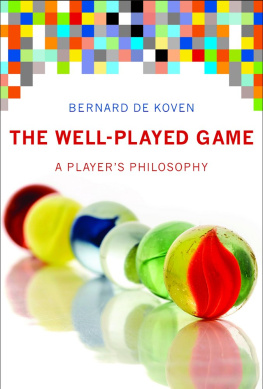
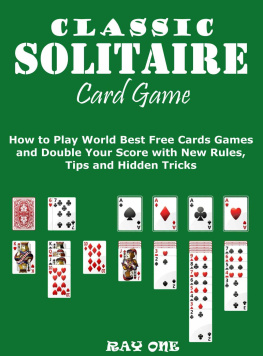

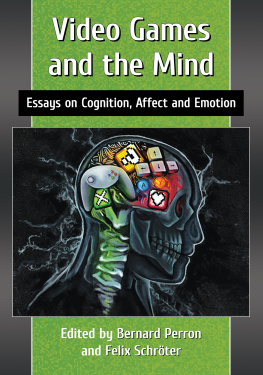

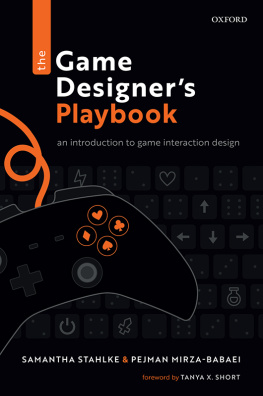


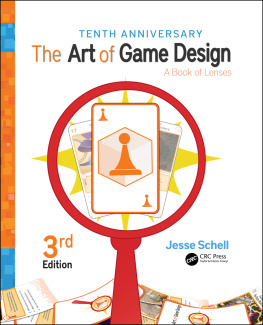
![Ethan Ham [Ethan Ham] - Tabletop Game Design for Video Game Designers](/uploads/posts/book/119417/thumbs/ethan-ham-ethan-ham-tabletop-game-design-for.jpg)
![Chris Bateman [Chris Bateman] - Beyond Game Design: Nine Steps Toward Creating Better Videogames](/uploads/posts/book/119409/thumbs/chris-bateman-chris-bateman-beyond-game-design.jpg)
